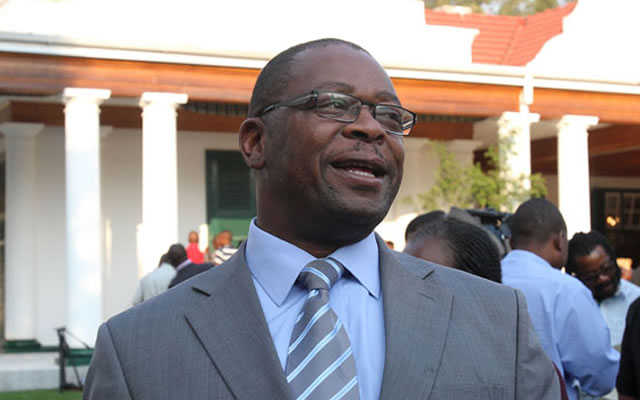Let’s make the economy tick

Victoria Ruzvidzo Business Focus
“Zimbabweans have gone through very interesting and challenging times but the good thing is that we will emerge out of all this victorious.”
This was the response I gave to a South African government official I sat with on the plane on my way to Cape Town on Monday, as she politely inquired about the challenges the country has been experiencing. Her name was Victoria coincidentally.
A few minutes after saying this, a statement that obviously elicited further discussion about our economy and politics, I went into deep thought as my mind sought to unpack the words that I had uttered.
Zimbabweans have become an attraction especially when you travel abroad. Everyone gets excited the minute they know you are Zimbabwean and they begin to ask questions such as “How is (President) Mugabe?” “How is the economy doing?” “Do you now have food to eat?” etcetera. It has been like this for years now.
Some of the questions can be a bit offending though but one quickly realises that the curiosity and concern is genuine oft times given the phase we went through around 2007 and 2008 when it had become fashionable to bring eggs, bread, mealie meal, etc, from your trip to South Africa.
One would walk with a spring carrying well wrapped crates of eggs at O. R. Tambo International Airport. Of course, the eyes directed at you would make one feel a bit uncomfortable but nothing would beat the smiles on your children’s faces when you got home with bread, eggs and polony. Party time it would be!
So indeed the concerns and curiosity are understandable from that point of view. Only in a few instances do you find someone getting out of their way to convince you, the Zimbabwean, that things in your country are so bad you can’t be optimistic and hopeful. Again this is excusable in some cases given some of the venom released by the private media about our country which many out there take to be reflective of the actual situation on the ground.
Who said we must camouflage the challenges? But conversely who says we must exaggerate? Let’s see things with a more realistic lense.
This calls on the need for Zimbabwe to embark on a major public relations and branding exercise to tell the true Zimbabwean story so that the world is not made to make decisions based on what it reads and not what the situation really is.
It’s very easy for the world to give an ear to anything that comes from Zimbabwe because somehow this small country has managed to charm the globe one way or the other. This is a scenario that can make or break this country depending on how we choose to use the available platform.
President Mugabe himself is such a big brand on the continent and beyond and we must use this currency positively. Like him or hate him, President Mugabe is a very likeable character and many Africans see him as one of the continent’s greatest heroes given his principled stance against imperialism by any name.
His unwavering stance even in face of debilitating illegal sanctions has earned him so much respect it’s unbelievable. He is a man of principle whose influence can be used to leverage Zimbabwe.
Economic performance is a sum-total of a lot of things and there would be no harm if President Mugabe’s charm could be turned into dollars through increased investment and trade.
This is critical as we approach the second lap of the year.
We are almost halfway through the year. We are yet to collate statistics as to how much ground has been covered in terms of growing the economy, increasing exports, reducing imports, creating jobs, saving companies from closure, attracting investment and inducing increased activity on the Zimbabwe Stock Exchange.
Is the Reserve Bank of Zimbabwe now playing its role as the lender of last resort effectively, is the interbank market working? Have banks become more
humane in their lending? Have borrowers become more disciplined in terms of repaying loans or the list of non-performing loans is growing?
We need to take stock of all these and more to ascertain the direction that the economy is taking. Is the economy still a bears market or its now bullish?
What could the Mid-Term Fiscal Policy have for the economy?
The African Development Bank (AfDB) has expressed optimism that our economy is on target to achieve the 3,2 percent GDP growth. They must be seeing something we are doing right or maybe they have confidence in our potential to re-establish ourselves and turn for the better in the remaining six months.
Zimbabwe is an important country and market which should begin to function optimally so it can play its strategic role in the region effectively. We are all too aware of the challenges besetting the economy and how we can get round these to produce great results. Listing them one by one is something we have done repeatedly but what is required now is to get down to business and do all we can as we write a better economic script that we will all be proud of come year end.
Bonds Coins
One of the positive outcomes has been the introduction of bond coins. Although they suffered initial resistance as Zimbabweans were sceptical given experiences with our local currency a few years back, the coins have largely been accepted now as a medium of exchange.
The fact that now service providers would rather have the bond coin as opposed to the rand coins shows the extent to which confidence has grown in using these. Change is no longer an issue. It has become normal to have all your change back to the cent after a transaction.
Most importantly, an increasing number of retailers have deduced prices, directly attributing this to the bond coins that have rendered price rounding off unnecessary.
This had an great effect on the pricing of a basket of foodstuffs. The multiplier effect of the 10cents or 15 cents per item savings leave the consumer with more disposable income.
Vendors
This week we have received quite some decisive measures by Government to normalise the situation. The ultimatum given vendors is something we have all be waiting for. It was long overdue but we are excited on prospects of having a cleaner and more organised Harare again.
We all agree, at least based on comments on the issue from a cross-section of Zimbabweans, that the insensible and haphazard vending was causing more harm that good to the economy.
It was not necessarily a form of aggressive marketing where you bring a product to the people to capitalise on sales but it was rather an unfortunate and flagrant disregard to zoning and the functions of a Central Business District.
Come Sunday, the deadline, we will be expecting to see the law descend on those that resist the call to relocate. Of course, we commiserate with vendors inasfar as they face immense hardship to raise their families, but selling in a more organised manner could bring them more good than harm.
We all drive to Mbare Musika to buy vegetables so certainly people will come to designated vending points if they intend to buy something. The usual law of supply and demand will obviously apply.
All the best to the vendors. They do have guts and that’s a trait that will make the bulk of them succeed in business. It’s all about risk, hey!
Imaging someone with the guts of roasting maize cobs in the middle of town, regardless of the environmental impact this has. That requires real guts.
But all is well that ends well.
Excess land
This is a hot potato but we want to commend the powers-that-be for seeking to ensure all available arable land is put to good use as Zimbabwe seeks to regain its breadbasket status.
We are told that those with excess land will have to surrender it so that it can be allocated to those that need it. Of course, owning a 1 000-hectare farm is a status symbol by any measure but when it comes to land, it is more about what you can do with it — the output, than just how much space is in your name.
The mantra that the economy is the land and land is the economy holds true. It’s no use clinging to land that can be used more productively by someone else. So we applaud the impending land audit which we would want done without fear or favour.
Those farms that exceed recommended sizes should really be reduced. We hope people like yours truly who desire to demonstrate their farming acumen and we hope to access a piece.
Lands and Rural Settlement Minister Dr Douglas Mombeshora sounds serious about his intentions. He has our support.
Civil Servants
Government workers feel hard done by their employer’s failure to increase their salaries. This is understandable given the generally expensive environment in which we live, especially in instances where we resist the call to live within our means.
The civil servants rightfully demand increments to improve their standard of living. However, it is unfortunate that the Government has said it is unable to pay.
The $3 billion it is already paying in salaries in no small change. In fact, Government has put a number of projects in abeyance because the bulk of its revenue goes towards salaries. This is a very harmful scenario.
It is under these circumstances that civil servants will have to exercise patience until the economy improves and Government’s pockets become fatter.
Even the private sector is largely failing to meet demands for salary increments because of challenges in the economy culminating in low production capacity, dwindling revenue and failure to access affordable capital, among other constraints.
What this means is that we all need to work towards improving the economy. This will obviously have a direct bearing on our pockets.
We have to grow the GDP and ensure the economy begins to tick again.
In God I Trust!
Email:[email protected]. WhatsApp Messenger 0772129972










Comments